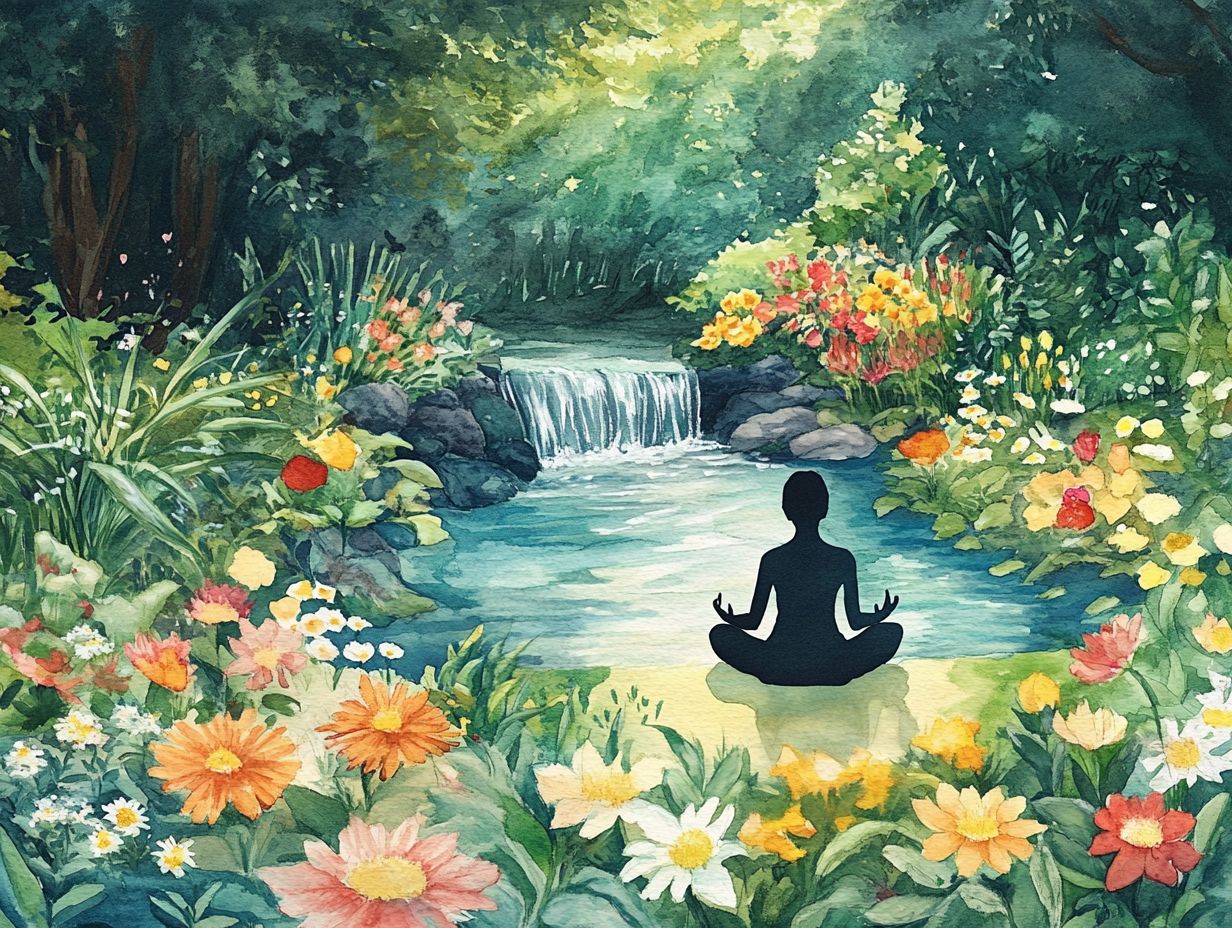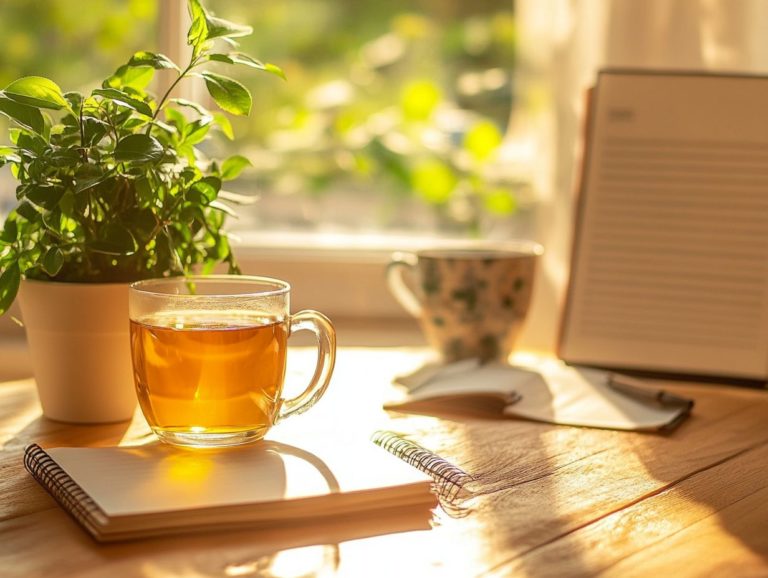4. Integrative Health Techniques for Stress Relief
Stress has become an inevitable companion in modern life, influencing both your physical and mental well-being.
Grasping its impact is essential for reclaiming control over your health. This exploration delves into the essence of stress, traditional methods like meditation and yoga, and additional methods such as acupuncture and aromatherapy.
Get ready to discover guidance on weaving these techniques into a personalized stress relief plan designed specifically for your unique needs. Discover effective strategies that empower you to reclaim your peace and enhance your overall health.
Contents
- Key Takeaways:
- Understanding Stress and Its Impact on Health
- Traditional Techniques for Managing Stress
- Complementary Approaches for Stress Relief
- Integrating Techniques for Holistic Stress Relief
- Creating a Personalized Stress Relief Plan
- Frequently Asked Questions
- What are natural methods for stress relief?
- What are some examples of natural methods for stress relief?
- How do these techniques help with stress relief?
- Are natural methods for stress relief safe?
- Can natural methods for stress relief be used alongside traditional medicine?
- Are there any precautions to take when practicing these techniques?
Key Takeaways:

- Incorporating traditional techniques like meditation and yoga can help reduce stress and improve overall well-being.
- Additional methods such as acupuncture and aromatherapy can effectively relieve stress and promote relaxation.
- Create a personalized stress relief plan that combines traditional and additional techniques for a holistic approach to managing stress.
Understanding Stress and Its Impact on Health
Understanding stress is crucial for effective management. Stress is a natural reaction to life s challenges, but when it becomes chronic, it can lead to various health issues, including anxiety, heart disease, and a weakened immune system.
According to the Mayo Clinic, recognizing the signs and symptoms of stress is your first step toward enhancing your overall well-being.
By incorporating stress relief strategies such as a balanced diet, regular physical activity, and improving your sleep quality you can effectively manage stress and promote a healthier lifestyle.
Embracing self-care practices is vital for maintaining balance and reducing stress’s impact on both your physical and mental health.
Defining Stress and Its Effects on the Body
Stress is both a psychological and physiological response that can unleash various effects on your body, including the release of stress hormones like cortisol, which is a hormone released in response to stress.
When stressors pile up and become overwhelming, you may grapple with muscle tension, particularly around your neck and shoulders, leading to discomfort or even pain. This persistent tension can complicate your sleep, as racing thoughts and physical discomfort conspire to rob you of a restful night.
The cascading effects of chronic stress can ripple through your overall health, potentially contributing to conditions such as hypertension and a weakened immune system.
Recognizing these manifestations is essential. Understanding how stress influences both your mental and physical well-being is the crucial first step toward achieving better health and balance in your life.
Traditional Techniques for Managing Stress
Traditional techniques for managing stress offer various practices aimed at fostering relaxation and enhancing your mental well-being, including integrative health approaches for emotional balance.
These include meditation, yoga, and engaging in physical activity each serving as a powerful tool to help you navigate the challenges of daily life.
Meditation and Mindfulness
Meditation and mindfulness are transformative techniques that can elevate your stress relief and cultivate a profound sense of calm and focus. By integrating these practices into your daily routine, you may find your anxiety levels diminishing and your emotional resilience strengthening.
Mindfulness meditation, in particular, invites you to remain present, allowing thoughts and worries to drift by without judgment. This practice hones your concentration and deepens your understanding of your personal thought patterns, leading to healthier responses to stress triggers.
Establishing a consistent routine even if it s merely a few minutes each day can truly reshape your mental landscape. Techniques such as:
- guided imagery
- loving-kindness meditation
- body scans
can enhance your overall well-being. For those looking for additional support, community classes or online resources offer valuable tools to help you navigate this enriching journey.
Start your stress relief journey today!
Yoga and Exercise

Incorporating yoga and physical activity into your routine can greatly enhance your stress relief and overall well-being. These activities help you focus on your breathing and movements, creating a meditative state.
It s not just about the poses; it’s about releasing endorphins those delightful hormones that elevate your mood. They play a key role in easing tension and promoting a sense of calm.
Combining yoga with other exercises like running, dancing, or strength training promotes relaxation and releases pent-up energy. This balanced fitness approach leads to better mental clarity and a positive outlook on life.
Complementary Approaches for Stress Relief
Complementary approaches for stress relief include methods like acupuncture, acupressure, and aromatherapy. Additionally, exploring integrative health techniques for pain relief can enhance traditional practices and boost your mental health.
Acupuncture and Acupressure
Acupuncture and acupressure are ancient therapies that can significantly relieve stress by targeting specific body points. These methods stimulate natural healing processes and promote deep relaxation.
By activating these points, these therapies regulate energy flow, often referred to as ‘Qi’ the life force in your body. Research shows they can lower cortisol levels and reduce anxiety.
Regular sessions may boost your emotional resilience, helping you navigate life s pressures more easily.
Discover the Magic of Aromatherapy and Essential Oils!
Aromatherapy and the use of essential oils are gaining popularity for stress relief and relaxation. These natural plant extracts enhance your space and provide therapeutic benefits.
For example, lavender oil is celebrated for its calming properties perfect for unwinding after a long day. Don t wait! Try lavender oil after a long day to feel the calming effects immediately.
Peppermint boosts energy and sharpens mental clarity, while eucalyptus helps relieve physical tension.
Incorporating these oils into your daily routine is easy. Add drops to a diffuser, mix them in a relaxing bath, or use them with carrier oils for a soothing massage.
Using these aromatic essences regularly can transform your space into a personal sanctuary, fostering peace and overall well-being.
Integrating Techniques for Holistic Stress Relief
By blending traditional techniques with complementary methods, you can create a tailored stress relief strategy. Incorporating energy healing techniques for stress relief into your personalized approach helps you tackle stress from multiple angles.
Combining Traditional and Complementary Methods

Combining traditional methods like yoga and meditation with complementary approaches such as aromatherapy and acupuncture can elevate your stress management. Exploring mind-body techniques that can reduce stress creates a holistic solution to stress.
Imagine finishing a calming yoga session, then inhaling soothing lavender essential oil to deepen your relaxation. Incorporating acupuncture targets stress points, offering immediate relief and restoring balance.
This mix of techniques shows that stress relief is not one-size-fits-all. Tailor your routine to fit your unique needs.
Ultimately, this combination helps you cultivate a resilient approach to daily pressures, making each day easier to handle. Customize your stress relief plans today for a brighter tomorrow!
Creating a Personalized Stress Relief Plan
Crafting a personalized stress relief plan requires you to pinpoint techniques that truly resonate with you. Exploring the benefits of mind-body practices for stress relief can effectively manage stress while enhancing your overall well-being.
This tailored strategy enables you to navigate life s challenges with greater ease and resilience.
Identifying the Best Techniques for Your Needs
Knowing what stresses you is key to crafting a stress management plan that aligns with your lifestyle and preferences.
Understanding your personal stress triggers requires a thoughtful approach, as everyone responds uniquely to different stressors.
Methods like journaling, mindfulness practices, and self-reflection can shed light on the challenges to your emotional well-being.
Engaging with supportive friends and family plays a pivotal role in alleviating stress. Open discussions can bring you instant emotional relief!
A balanced diet rich in nutrients can significantly boost your resilience to stress, as certain foods elevate your mood and energy levels.
By evaluating these methods collectively, you can ensure a personalized strategy that fosters a healthier, more balanced life.
Frequently Asked Questions
What are natural methods for stress relief?
Natural methods for stress relief are integrative health approaches for holistic healing that combine both body and mind to help manage and reduce stress levels.
What are some examples of natural methods for stress relief?

Examples include yoga, meditation, acupuncture, massage therapy, and herbal remedies.
How do these techniques help with stress relief?
These techniques activate the body’s relaxation response, reduce muscle tension, promote mindfulness and deep relaxation, and lower stress hormone production, aligning with integrative health practices for emotional healing.
Are natural methods for stress relief safe?
Yes, these methods are generally safe and do not have harmful side effects. However, it is essential to consult with a healthcare professional before trying any new technique.
Can natural methods for stress relief be used alongside traditional medicine?
Yes, these techniques can complement traditional medicine. Many doctors recommend incorporating them into treatment plans for stress-related conditions.
Are there any precautions to take when practicing these techniques?
It’s important to listen to your body and not push yourself too hard, especially if you are new to these methods. Always consult with a healthcare professional if you have any underlying medical conditions or are pregnant before trying new techniques.






